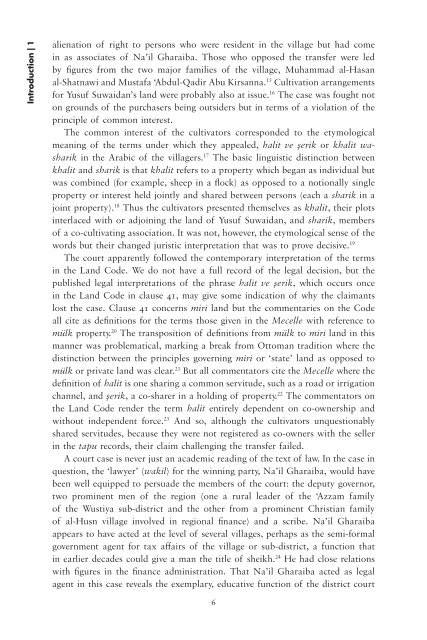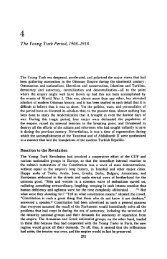Governing property, making the modern state - PSI424
Governing property, making the modern state - PSI424
Governing property, making the modern state - PSI424
Create successful ePaper yourself
Turn your PDF publications into a flip-book with our unique Google optimized e-Paper software.
Introduction | 1<br />
alienation of right to persons who were resident in <strong>the</strong> village but had come<br />
in as associates of Na’il Gharaiba. Those who opposed <strong>the</strong> transfer were led<br />
by figures from <strong>the</strong> two major families of <strong>the</strong> village, Muhammad al-Hasan<br />
al-Shatnawi and Mustafa ‘Abdul-Qadir Abu Kirsanna. 15 Cultivation arrangements<br />
for Yusuf Suwaidan’s land were probably also at issue. 16 The case was fought not<br />
on grounds of <strong>the</strong> purchasers being outsiders but in terms of a violation of <strong>the</strong><br />
principle of common interest.<br />
The common interest of <strong>the</strong> cultivators corresponded to <strong>the</strong> etymological<br />
meaning of <strong>the</strong> terms under which <strong>the</strong>y appealed, halit ve şerik or khalit washarik<br />
in <strong>the</strong> Arabic of <strong>the</strong> villagers. 17 The basic linguistic distinction between<br />
khalit and sharik is that khalit refers to a <strong>property</strong> which began as individual but<br />
was combined (for example, sheep in a flock) as opposed to a notionally single<br />
<strong>property</strong> or interest held jointly and shared between persons (each a sharik in a<br />
joint <strong>property</strong>). 18 Thus <strong>the</strong> cultivators presented <strong>the</strong>mselves as khalit, <strong>the</strong>ir plots<br />
interlaced with or adjoining <strong>the</strong> land of Yusuf Suwaidan, and sharik, members<br />
of a co-cultivating association. It was not, however, <strong>the</strong> etymological sense of <strong>the</strong><br />
words but <strong>the</strong>ir changed juristic interpretation that was to prove decisive. 19<br />
The court apparently followed <strong>the</strong> contemporary interpretation of <strong>the</strong> terms<br />
in <strong>the</strong> Land Code. We do not have a full record of <strong>the</strong> legal decision, but <strong>the</strong><br />
published legal interpretations of <strong>the</strong> phrase halit ve şerik, which occurs once<br />
in <strong>the</strong> Land Code in clause 41, may give some indication of why <strong>the</strong> claimants<br />
lost <strong>the</strong> case. Clause 41 concerns miri land but <strong>the</strong> commentaries on <strong>the</strong> Code<br />
all cite as definitions for <strong>the</strong> terms those given in <strong>the</strong> Mecelle with reference to<br />
mülk <strong>property</strong>. 20 The transposition of definitions from mülk to miri land in this<br />
manner was problematical, marking a break from Ottoman tradition where <strong>the</strong><br />
distinction between <strong>the</strong> principles governing miri or ‘<strong>state</strong>’ land as opposed to<br />
mülk or private land was clear. 21 But all commentators cite <strong>the</strong> Mecelle where <strong>the</strong><br />
definition of halit is one sharing a common servitude, such as a road or irrigation<br />
channel, and şerik, a co-sharer in a holding of <strong>property</strong>. 22 The commentators on<br />
<strong>the</strong> Land Code render <strong>the</strong> term halit entirely dependent on co-ownership and<br />
without independent force. 23 And so, although <strong>the</strong> cultivators unquestionably<br />
shared servitudes, because <strong>the</strong>y were not registered as co-owners with <strong>the</strong> seller<br />
in <strong>the</strong> tapu records, <strong>the</strong>ir claim challenging <strong>the</strong> transfer failed.<br />
A court case is never just an academic reading of <strong>the</strong> text of law. In <strong>the</strong> case in<br />
question, <strong>the</strong> ‘lawyer’ (wakil) for <strong>the</strong> winning party, Na’il Gharaiba, would have<br />
been well equipped to persuade <strong>the</strong> members of <strong>the</strong> court: <strong>the</strong> deputy governor,<br />
two prominent men of <strong>the</strong> region (one a rural leader of <strong>the</strong> ‘Azzam family<br />
of <strong>the</strong> Wustiya sub-district and <strong>the</strong> o<strong>the</strong>r from a prominent Christian family<br />
of al-Husn village involved in regional finance) and a scribe. Na’il Gharaiba<br />
appears to have acted at <strong>the</strong> level of several villages, perhaps as <strong>the</strong> semi-formal<br />
government agent for tax affairs of <strong>the</strong> village or sub-district, a function that<br />
in earlier decades could give a man <strong>the</strong> title of sheikh. 24 He had close relations<br />
with figures in <strong>the</strong> finance administration. That Na’il Gharaiba acted as legal<br />
agent in this case reveals <strong>the</strong> exemplary, educative function of <strong>the</strong> district court<br />
6












